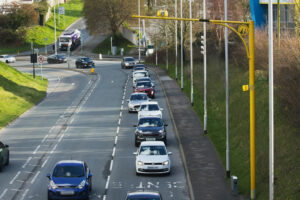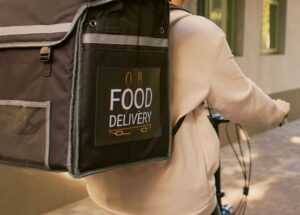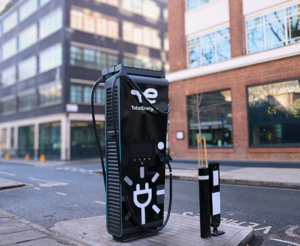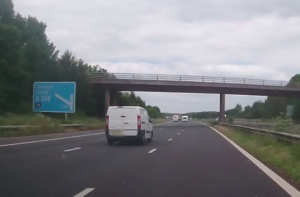ANALYSIS By Anusha Rajasooriya, TRL
Some cities and municipalities have, or are in the process of, temporarily widening footways and bike lanes to cater for the increase in pedestrians and cyclists (while also observing a substantial reduction in motorised traffic) resulting from the imposed lockdowns to mitigate the spread of Covid-19. Cities such as Berlin and Bogota have borrowed road space, previously demarked primarily for motorised traffic and reallocated it for active travel modes. Examples of these ‘pop-up’ facilities include relatively inexpensive removable road marking tape to create new or widen existing bike lanes and use of flexible posts to create safer, segregated facilities.
‘Pop-up’ walking and cycling facilities allow local authorities to achieve ‘quick wins’ and may also support long-term strategies to combat traffic congestion, improve public health and meet climate change objectives. Until lockdowns are lifted or relaxed, ‘pop-up’ facilities allow local authorities to balance road user needs and provide for all modes without compromising road safety or traffic flow. Safely practising social distancing is a challenge on many streets when footways are often narrower than 2m. Even when some lockdown measures are lifted, it is unlikely that the requirement to socially distance will be removed in the near future, at least until a vaccine becomes available. ‘Pop-up’ facilities thereby help to manage this and enable the public to adhere to the social distancing advice safely without the need to unnecessarily encroach onto road space dominated by motorised modes.
Likewise, these facilities may also contribute towards lowering traffic speeds in residential areas. The lockdown (and the substantial reduction in traffic volumes) has reportedly influenced an increase in the number of speeding motorists (BBC, 22nd April 2020). This has potential to be detrimental when factoring in the rise of pedestrian and cyclist activity; raising the risk of traffic collisions between motorised vehicles and vulnerable road users. Local authorities could apply ‘pop-up’ facilities to combat this, using it as a traffic calming intervention to maintain lower vehicle speeds in residential streets and town centres.
TRL research shows the merits of using narrower lanes in reducing vehicle speeds. This is a common temporary traffic management strategy implemented on road works schemes across the UK to generate compliance with lowered speed restrictions. A strategy that can be mimicked on the local road network to ensure compliance and preserve the safety of vulnerable road users. Trials of these facilities could also help local authorities to evaluate opportunities for longer term implementation of improved infrastructure for walking and cycling.
Encouraging the public to walk and cycle to meet their essential needs will hopefully have a positive long-term impact. Those who take up cycling or walking to escape life under lockdown might consider doing so more frequently post lockdown if appropriate infrastructure is provided for them to have a positive experience.
If such behavioural changes can be triggered and sustained, cities can effectively and inexpensively mitigate the ill-effects of traffic congestion and climate change. Encouraging active travel is key to meeting emissions targets and lowering auto-dependency and single occupant car trips, that might otherwise increase if individuals refrain from using public transport in the future.
Furthermore, an increased uptake of active travel can only reduce the strain on the NHS by promoting better public health. There is evidence to suggest that those with underlying health conditions are more susceptible to a severe or fatal attack from the virus. Given this, promoting essential trips via active travel seems a logical mitigation in lowering the collective risk of developing obesity, heart disease and other underlying conditions that are proving to be serious in face of Covid-19. In the absence of a vaccine, active travel might therefore be a tool used by local and health authorities to lessen the strain on healthcare brought on by the virus.
Even as this article is being drafted, news keeps breaking on how more and more cities are re-visualising the urban realm and re-configuring streets to prioritise active travel. For example, Brighton, Cardiff, Edinburgh and Glasgow are already implementing measures to encourage safer active travel, and social distancing.
Local authorities should use this opportunity to examine the current condition of their road network, factoring in anticipated behavioural changes, and rectifying pre-existing road safety concerns which if not for Covid-19 would have laid dormant.
TRL is well positioned to help local and road authorities explore the idea of installing ‘pop-up’ walking and cycling facilities on their road networks. Our engineers, data and behavioural scientists can devise evidence-based strategies to optimise the implementation of ‘pop-up’ walking and cycling facilities and re-orientate cities to inspire long-term modal shifts towards active travel. We can help to prepare for a ‘new normal, learning from this period of extreme change and helping to build plans for how the urban transport environment could look post Covid-19.
These are challenging times, with a lot of uncertainties, but they also present an opportunity to re-think the form and function of cities and urban areas for the better of its citizens, and to enable a meaningful effort towards meeting the climate change and pollution challenges. An opportunity well worth seizing.
References for this article:
Version:1.0 StartHTML:000000243 EndHTML:000009800 StartFragment:000008983 EndFragment:000009720 StartSelection:000009034 EndSelection:000009710 SourceURL:https://trl.co.uk/news/news/covid-19-and-need-pop-walking-and-cycling-facilities COVID-19 and the need for ‘pop-up’ walking and cycling facilities | TRL
BBC, 20th April 2020 Coronavirus: Banning cars made easier to aid social distancing. Article by Roger Harrabin, BBC environment analyst. Available at: https://www.bbc.co.uk/news/science-environment-52353942
BBC, 22nd April 2020. Coronavirus: Speeding drivers flout limit during lockdown. Article by Alex Homer, BBC Shared Data Unit. Available at: https://www.bbc.co.uk/news/uk-52370352.
























